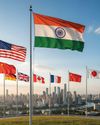試す 金 - 無料
THE PRIVATIZATION OF INDIA'S DEFENSE SECTOR
Extraordinary and Plenipotentiary Diplomatist
|November 2020
LIMITATIONS AND PROSPECTS

Privatization within the Indian defense sector largely began with the onset of the 21st century, when India ushered in liberalization and economic reforms throughout the Indian economy as a whole. These efforts aimed at liberalization and reforms were intended to prompt a shift away from a state-led command economy that had been instituted during the Cold War. Also, this shift away from a command economy would entail handing over the reins of a number of state-owned enterprises to the private sector in order to boost efficiency and quality.
But for the most part, India’s defense sector still remains heavily reliant on support from both the Indian government as well as technologically advanced nations such as Russia and more recently the United States. India’s reliance on Russia for defense capabilities began in 1965 after India’s war with Pakistan. Because of the Cold War context, the United States in 1965 imposed an embargo on weapons sales to India as a concession to its Pakistani ally, and as a result, India turned to the former Soviet Union and thus Russia for defense support.
However, in the 21st century and despite foreign support, the Indian government remains the most important patron of Indian defense by providing for approximately 80 percent of development costs. Nevertheless, there has been an increase of approximately 26 percent in ‘Foreign Direct Investment’ (FDI) in India’s defense sector. Tata and Airbus are believed to be the two private companies who have procured the weightiest contracts for private defense development in India.
このストーリーは、Extraordinary and Plenipotentiary Diplomatist の November 2020 版からのものです。
Magzter GOLD を購読すると、厳選された何千ものプレミアム記事や、10,000 以上の雑誌や新聞にアクセスできます。
すでに購読者ですか? サインイン
Extraordinary and Plenipotentiary Diplomatist からのその他のストーリー

Extraordinary and Plenipotentiary Diplomatist
Indian Strategies for Diversifying Export Markets Amid U.S. Tariff Pressures
India's rising economic power at the international level has presented challenges alongside opportunities to New Delhi.
5 mins
October 2025

Extraordinary and Plenipotentiary Diplomatist
Compulsions and Constraints before India's Foreign Policy
Although the present leadership in India clearly supports a multipolar world order, the US’s unparalleled ascendance with its self-obsessed approach in international relations has gravely hurt the national interests of poor and developing nations clubbed as the Third World, including India.
3 mins
October 2025

Extraordinary and Plenipotentiary Diplomatist
Responsible AI & Global Governance
India's Role amid BRICS, G20, and Global South Calls
7 mins
October 2025

Extraordinary and Plenipotentiary Diplomatist
INDIA AT UNGA-80 From Presence to Proposition
Every September, New York's diplomat-strewn avenues assume the cadence of high diplomacy.
6 mins
October 2025

Extraordinary and Plenipotentiary Diplomatist
Wadephul in India
Germany's India Outreach in a Fragmented Europe
4 mins
October 2025

Extraordinary and Plenipotentiary Diplomatist
RAPPROCHEMENT WITH CHINA
BEYOND THE BORDER - TRADE, COMMERCE, AND PEOPLE-TO-PEOPLE TIES
5 mins
October 2025

Extraordinary and Plenipotentiary Diplomatist
FTAs and Outward FDIS
Way forward to safeguard national interest in the Trump Era
4 mins
October 2025

Extraordinary and Plenipotentiary Diplomatist
What Leaders Must Do Now: Sir David King's Call for Climate Action
Sir David King is one of the world's foremost climate change leaders, renowned for his tireless work in confronting the global climate crisis. Serving as the UK Government's Chief Scientific Adviser from 2000 to 2007, he was instrumental in placing climate change at the top of the international agenda.
6 mins
October 2025

Extraordinary and Plenipotentiary Diplomatist
Safe Food, Secure Future
Globally, nearly 600 million people suffer from foodborne diseases, and more than 400,000 die each year from consuming unhygienic and unsafe food.
3 mins
October 2025

Extraordinary and Plenipotentiary Diplomatist
H-1B Visa Fee Surge & India's Tech Sector Exodus or Adaptation?
\"When the winds of change blow, some build walls, others build windmills.” It’s an old saying, but it fits quite well right now. With the U.S. suddenly raising H-1B visa petition fees to $100,000, India’s tech industry finds itself in the middle of a storm.
2 mins
October 2025
Translate
Change font size
